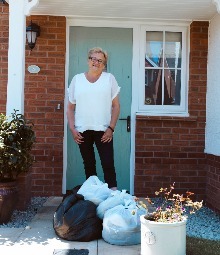From areas of outstanding beauty to your local park, the UK’s natural habitats are important and need to be protected. Not only are our treasured natural spaces crucial to providing rest, relaxation and exercise for people all over the UK, but they are also the homes of millions of plants and animals.
Protecting our wild places and encouraging biodiversity will help us fight climate change and ensure a bright future that is full of nature for everyone.
Why are our natural habitats under threat?
The negative effects of global warming
Climate change is posing new threats to survival for humans, plants and animals. Global warming causes freak weather conditions like floods, droughts, intense storms and irregular seasons.
These environmental changes destroy natural habitats and disrupt the ecosystem by affecting hibernation, growth and migration patterns. The consequence is that nature can’t adapt fast enough to withstand the damage being caused.

Human activity is the single biggest cause of habitat destruction
The way that humans live all over the world is negatively impacting our planet. Natural habitats are cleared every day to make way for farming, livestock grazing, mining, drilling and expanding urban areas.
For example, when rainforests are cut down to grow crops, or key coastal wetlands are dredged to construct an industrial plant, countless species are affected. The loss of biodiversity creates a domino effect, causing our natural environment to be less healthy and full of life.

What are we doing to protect UK natural habitats?
Nature reserves
Nature reserves are areas that are protected by the government, to keep the special animals and plants that live there away from harm.
These protected areas cannot be cleared or built on, which ensures that they stay beautiful for generations to come.
In amazing recent news, a new ‘super nature reserve’ is going to be created in Somerset, protecting precious saltmarsh, heath and wetland habitats.
These coastal habitats are some of the most important to protect, because they are brilliant at storing carbon in the earth, helping to slow global warming.

National Charity Organisations
The UK has several large organisations, like the National Trust, the RSPB, Rewilding Britain and more, that protect our natural habitats. Areas like the Lake District and the Yorkshire Dales are kept beautiful because of these organisations, which rely heavily on volunteers!
From planting carbon-absorbing moss on moors, to working with farmers to teach sustainable agriculture practices, these groups drive important conservation efforts all over the British Isles.

Local Conservation Volunteers
As well as large organisations, there are lots of smaller, local groups of conservation volunteers. You can join these to help protect and improve wild spaces in your community.
The Conservation Volunteers (TCV), have groups all over the UK that allow people to get involved with gardening and protecting wildlife. They even have ‘Green Gyms’ where you can exercise by taking part in physical activities such as planting trees and sowing meadows – all for free!

Sustainable Development
Sustainable development is any progress or advancement that takes into account the impact the project will have on humans and wildlife.
More and more, UK businesses are investing in eco-friendly development. This includes renewable energy, considerate construction and sustainable manufacturing with recycled materials.
Not only does sustainable development help to reduce climate change and damage to the natural world, but it also aims to lift up people in poverty and make long-lasting change, not just a profit.

To sum up, people all over the UK are fighting for our natural habitats to be conserved. But there is still work to be done, and you can help! Get involved with free community conservation initiatives or try and live as sustainability as you can by reducing energy consumption and plastic waste.
For eco-friendly living tips, climate updates and much more, follow us on social media @ForHousing.
















